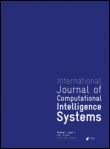
International Journal of Computational Intelligence Systems
Scope & Guideline
Connecting Researchers with Cutting-Edge Insights
Introduction
Aims and Scopes
- Computational Intelligence Techniques:
The journal emphasizes the development and application of computational intelligence techniques, including neural networks, fuzzy logic, and genetic algorithms, to address real-world problems. - Data Analysis and Machine Learning:
A core focus is on the use of machine learning and data analysis techniques to extract insights from complex datasets, enabling predictive modeling and decision-making. - Optimization Algorithms:
Research on optimization algorithms, particularly those inspired by nature, such as swarm intelligence and evolutionary algorithms, is prominently featured. - Interdisciplinary Applications:
The journal encourages interdisciplinary research that applies computational intelligence methodologies in diverse areas, including healthcare, finance, education, and environmental science. - Real-time and Adaptive Systems:
There is a consistent focus on developing real-time systems and adaptive models that can learn from data and improve over time, particularly in dynamic environments.
Trending and Emerging
- Deep Learning Applications:
There is a significant increase in research involving deep learning applications across various fields, particularly in image processing, natural language processing, and healthcare diagnostics. - Explainable AI:
Emerging interest in explainable AI (XAI) reflects a growing demand for transparency and interpretability in AI systems, with researchers focusing on methods to make AI decisions more understandable. - Integration of AI with IoT:
The convergence of artificial intelligence with the Internet of Things (IoT) is a trending theme, with studies exploring smart systems that leverage AI for enhanced data processing and decision-making. - Sustainability and Green Technologies:
Research that emphasizes sustainable practices and the application of computational intelligence in environmental monitoring and energy efficiency is becoming increasingly prominent. - Multi-modal Learning:
The trend towards multi-modal learning, which integrates various data types (e.g., text, images, and audio) for more robust models, is gaining popularity among researchers.
Declining or Waning
- Traditional Statistical Methods:
There has been a noticeable decline in publications focusing on traditional statistical methods, as researchers increasingly favor machine learning and data-driven approaches. - Basic Theoretical Frameworks:
Research centered on basic theoretical frameworks without practical applications is less frequent, as there is a shift towards applied research that demonstrates clear real-world relevance. - Fuzzy Logic without Integration:
Studies that solely focus on fuzzy logic techniques without integrating them with other computational intelligence methods have become less prevalent, indicating a trend towards hybrid approaches.
Similar Journals
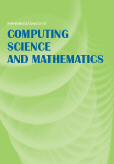
International Journal of Computing Science and Mathematics
Empowering Research in Computing Science and MathematicsThe International Journal of Computing Science and Mathematics, published by INDERSCIENCE ENTERPRISES LTD, is a pivotal platform for the dissemination of cutting-edge research in the intertwined disciplines of computing science and mathematics. With an ISSN of 1752-5055 and an E-ISSN of 1752-5063, the journal primarily serves the academic community engaged in applied mathematics, computational mathematics, theoretical computer science, and more, making significant contributions that resonate across various fields of technology and science. While the journal is currently categorized in the Q4 quartile for multiple related fields, including Applied Mathematics and Computational Theory, it continues to strive towards advancing the knowledge and practice within these areas. Spanning years from 2007 to 2010 and again from 2012 to 2024, the journal seeks to publish high-quality, peer-reviewed articles that not only address theoretical advancements but also explore practical applications of computing science in mathematical contexts, thereby fostering collaboration among researchers, professionals, and students alike. Please note that this journal is not available as Open Access, thus ensuring a curated content selection intended for dedicated research communities.

International Journal of Applied Mathematics and Computer Science
Advancing Knowledge at the Intersection of Mathematics and TechnologyThe International Journal of Applied Mathematics and Computer Science is a premier open-access journal published by SCIENDO, dedicated to advancing knowledge in the interdisciplinary fields of applied mathematics, computer science, and engineering. Since its inception in 2001, the journal has continually provided a platform for researchers to publish high-quality, peer-reviewed articles, contributing significantly to its fields, as evidenced by its strong Q2 quartile rankings in 2023 across key disciplines. With a notable impact factor and ranking within the Scopus database—#135 in Applied Mathematics and #45 in Computer Science—the journal emphasizes innovative research and practical applications. Open access since 2014, it has aimed to foster collaboration and ensure that vital scientific knowledge is accessible to a broader audience, positioning itself as an essential resource for researchers, professionals, and students seeking to stay on the cutting edge of technological and mathematical advancements.
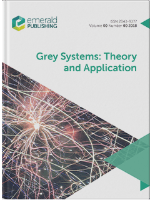
Grey Systems-Theory and Application
Transforming Theory into Practical Applications in Grey SystemsGrey Systems - Theory and Application is a premier journal dedicated to advancing the field of grey systems theory, which plays a pivotal role in addressing uncertainties in complex systems across various domains. Published by Emerald Group Publishing Ltd in the United Kingdom, this journal has established itself as a respected platform for innovative research, boasting a commendable 2023 impact factor reflected in its Q2 categorization in applied mathematics, computer science, and control systems engineering. With Scopus rankings placing it in the top tiers of its fields, it provides a robust forum for researchers, professionals, and students to explore theoretical developments and practical applications. The journal, which has been converged from 2011 to 2024, encourages open conversations on the theoretical underpinnings and real-world implications of grey systems, making it an essential resource for those looking to deepen their understanding and contribute meaningfully to this dynamic area of study.

Evolutionary Intelligence
Exploring the Synergy of Intelligence Across DisciplinesEvolutionary Intelligence is a prestigious journal published by Springer Heidelberg, dedicated to the interdisciplinary study of Artificial Intelligence, Cognitive Neuroscience, Computer Vision, and Mathematics. With its ISSN 1864-5909 and E-ISSN 1864-5917, the journal has established a significant presence in the academic community since its inception in 2008. Spanning a diverse range of topics relevant to both theoretical and empirical research, it has achieved impressive rankings, including Q3 in Artificial Intelligence and Cognitive Neuroscience, and Q2 in Computer Vision and Pattern Recognition as of 2023. With a strong Scopus ranking that places it in the top quartiles of its field, Evolutionary Intelligence serves as an essential platform for scholars and practitioners seeking to advance knowledge and foster innovation in these dynamic fields. Researchers, professionals, and students alike will find invaluable insights and cutting-edge findings that challenge existing paradigms and inspire future explorations in intelligence-related studies.
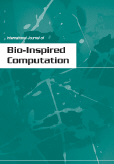
International Journal of Bio-Inspired Computation
Transforming Natural Insights into Computational ExcellenceInternational Journal of Bio-Inspired Computation, published by INDERSCIENCE ENTERPRISES LTD, is a leading platform dedicated to advancing research in the fields of bio-inspired computing and its applications. With a robust ISSN of 1758-0366 and E-ISSN of 1758-0374, this journal contributes significantly to the discourse in Computer Science, particularly emphasizing theoretical and practical frameworks that mirror natural processes. Situated in Switzerland, this peer-reviewed journal operates under a rigorous editorial process, ensuring high-quality publications that attract considerable attention, as evidenced by its placement in the Q2 category for 2023 in General Computer Science and Q3 in Theoretical Computer Science. With Scopus rankings reflecting its growing influence—ranked #62 out of 232 in General Computer Science and #36 out of 130 in Theoretical Computer Science—this journal invites researchers, professionals, and students to explore innovative methodologies and development in bio-inspired technologies. Although it currently does not adopt an open-access model, the journal remains committed to disseminating vital research that fuels advancements in computational intelligence, fostering collaboration and knowledge exchange in the ever-evolving landscape of computing.

Memetic Computing
Advancing the Frontiers of Computational InnovationMemetic Computing is a premier academic journal published by SPRINGER HEIDELBERG, dedicated to advancing research in the interdisciplinary domains of computer science and control optimization. With an impact factor that places it in the prestigious Q1 category for both Computer Science and Control and Optimization as of 2023, Memetic Computing stands at the forefront of innovation, offering researchers, professionals, and students a vital platform to explore and disseminate transformative findings in these rapidly evolving fields. With convergence periods specified from 2009 to 2024, the journal aims to illustrate the synergy between algorithmic and natural systems, reflecting current trends and future trajectories within the scope of memetic algorithms. Its robust Scopus rankings signal its significance as an influential resource within the global academic community. This journal is invaluable for those looking to enhance their understanding and engage with cutting-edge research that blends computational theory with practical applications.
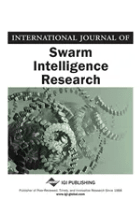
International Journal of Swarm Intelligence Research
Unveiling Insights in Swarm Intelligence ResearchInternational Journal of Swarm Intelligence Research, published by IGI Global, stands at the forefront of research in the dynamic field of artificial intelligence, focusing specifically on swarm intelligence and its applications. With an ISSN of 1947-9263 and an E-ISSN of 1947-9271, this journal has carved a niche within academia since its inception, boasting a commendable Q3 rank in the categories of Artificial Intelligence, Computational Theory and Mathematics, and Computer Science Applications as of 2023. The journal spans vital research from the years 2017 to 2024, fostering an environment that welcomes innovative studies that apply natural systems principles to computational methodologies. Although not classified as Open Access, the journal remains accessible to a broad audience, providing vital insights and fostering discussion among researchers, professionals, and students delving into cutting-edge swarm intelligence topics. As such, this journal is an essential resource for those aiming to advance their understanding and application of these transformative technologies.
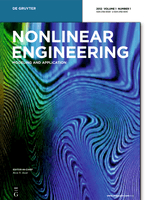
Nonlinear Engineering - Modeling and Application
Advancing the Frontiers of Nonlinear EngineeringNonlinear Engineering - Modeling and Application is a premier journal dedicated to advancing the fields of engineering, modeling, and simulation, published by De Gruyter Poland Sp. z o.o. since 2012. With an impressive impact factor reflected in its prestigious rankings—Q2 in Chemical Engineering and Miscellaneous Engineering and Q3 in Computer Networks and Communications—this journal serves as an invaluable resource for researchers and practitioners seeking to explore the intricacies of nonlinear systems and their applications. As an Open Access journal since 2019, it ensures that groundbreaking research is readily available to the global community, fostering collaboration and innovation. Situated at the forefront of its field, Nonlinear Engineering provides high-quality, peer-reviewed articles that contribute to understanding complex phenomena in various engineering disciplines, making it an essential publication for those eager to stay on the cutting edge of technology and research.
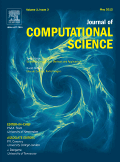
Journal of Computational Science
Bridging Theory and Application in Computational ScienceThe Journal of Computational Science, published by Elsevier, is a premier academic journal that serves as a vital platform for researchers and professionals in the fields of computer science, modeling, and simulation. With an ISSN of 1877-7503 and an E-ISSN of 1877-7511, this journal focuses on the latest advances in computational methodologies and their applications, fostering interdisciplinary dialogue and collaboration. As of 2023, it holds an impressive Q2 ranking in multiple categories, including Computer Science (miscellaneous), Modeling and Simulation, and Theoretical Computer Science, showcasing its relevance and impact within the scholarly community. The journal features comprehensive research articles, reviews, and case studies that contribute significantly to the understanding and development of computational techniques. With its high standing in Scopus rankings, including a 79th percentile ranking in Mathematics - Modeling and Simulation, the Journal of Computational Science is an essential resource for anyone seeking to advance their knowledge and research in this dynamic field.
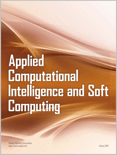
Applied Computational Intelligence and Soft Computing
Elevating Engineering with Computational InsightsApplied Computational Intelligence and Soft Computing, published by HINDAWI LTD, is a premier open access journal that has been disseminating critical research since 2009, focusing on the intersection of artificial intelligence and soft computing. With an impressive array of quartile rankings in 2023, including Q2 in Civil and Structural Engineering and Computational Mechanics, this journal has established itself as a significant contributor to the fields of computer science and engineering. Based in Egypt, it plays a vital role in advancing knowledge by providing researchers, professionals, and students with easy access to high-quality studies. The journal’s rigorous peer-review process ensures that only the most impactful research is highlighted, making it an essential resource for those looking to stay abreast of the latest innovations and methodological advancements in applied computational intelligence. Its Scopus rankings further affirm its influence and reputation within the academic community, exemplifying its commitment to facilitating collaboration and fostering intellectual discourse in various scientific domains.